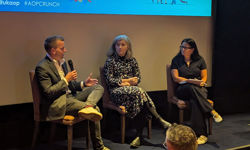The current issue of my weekly newspaper - a venerable institution dating back more than 200 years - runs to 72 pages. It contains everything you might expect to find in a local newspaper: pictures of people at events, obituaries, club notes, sports results, ads from around the community.
What there isn't is any kind of original journalism. Nowhere is there any evidence that anyone at the paper thought: "I wonder what's going on there?" or "shall we find out what happened to [fill in blank]?"
The news agenda is now hijacked by big business, charities, councils and even emergency services who decide what accidents, burglaries or fires we should learn about. These organisations peddle their own agendas with the tacit agreement of reporters, editors and ultimately owners.
When challenged, excuses for this lamentable state of affairs are many and various, most involving "not enough time" and "providing material for website". Whatever the explanation, it's just a cover-up for a lack of training, investment and ambition.
Regional journalism is no longer an attractive option for go-getting young people wanting a worthwhile media career. Now they've got up and gone elsewhere, to the digital world or the excitements of truly multimedia enterprises, not just ones playing around at the edges.
I fear for the recruitment and selection of young journalists plus the nurturing of talent that will become the managers and leaders of the newsroom. The big groups have it in their power to influence recruitment, training and retention strategies. But there is precious little evidence that anything has been done to up their game.
There is no quibble with Trinity Mirror. They have some good people who know what they are doing. The issue is more with the concentration of power and influence. The bigger the group, the less room for flair, adventure and independence of thought or deed. I see some consolidation coming resulting in a new oversized beast that is too big to manage properly.
Many readers neither know nor care who the owner is - and nor do a lot of the staff - but they do mind that their local paper and its digital counterparts cease to be an accurate reflection of their lives. The more local media fails to represent its community, the fewer people will engage - and all the economies of scale in the world count for nought if you have no audience.
Neil Fowler disagrees! He thinks the takeover of Local World is a good thing. Read his article here.












